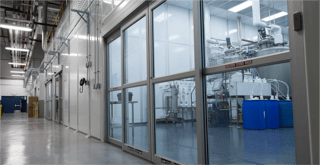Is smart manufacturing about to usher in a fourth Industrial Revolution?
According to some experts, it’s already underway.
While smart devices drive much of the conversation around connectedness, “smart processes” are at the forefront for industry leaders in the world of manufacturing. We’re on a journey to connect the far reaches of the manufacturing world and it sure feels pretty revolutionary.
Here’s a look at why.
Trial and error no more
Trial and error is a tremendous way to learn. You try something new, you make a mistake and you emerge wiser and stronger. In the semiconductor industry, however, an error can cost manufacturers hundreds of thousands of dollars, possibly more.
Smart manufacturing’s most promising benefit lies in how manufacturers can adjust on the fly. We’ll soon be able to determine the outcomes of certain processes before they’re even complete, leading to more reliable maps with fewer reworks. We won’t sink significant time and money into a theoretical process and find out it doesn’t work on the other end.
We’re not quite there, but for manufacturers everywhere, that’s a very enticing prospect.
Why smart manufacturing is important
 Brewer Science, like thousands of companies in this age of globalization, has offices and facilities all over the world. Those facilities must distribute and synthesize significant amounts of manufacturing and process data as quickly and efficiently as possible. On top of that, it must do so across eight countries and three continents. And we know we’re not the only ones.
Brewer Science, like thousands of companies in this age of globalization, has offices and facilities all over the world. Those facilities must distribute and synthesize significant amounts of manufacturing and process data as quickly and efficiently as possible. On top of that, it must do so across eight countries and three continents. And we know we’re not the only ones.
Manufacturers account for more than “three-quarters of all private-sector research and development… in the nation," according to the National Association of Manufacturers and the Bureau of Economic Analysis.
This means, through smart manufacturing, we can more efficiently enable one of the most powerful R&D engines in the U.S. economy. When more fully implemented, it will allow for an unprecedented level of connectedness between equipment, processes and personnel, allowing global companies to communicate and create as if they’re right next door to each other.
Plenty of risk
That’s not to say smart manufacturing comes without risk. Global connectivity is a huge problem to tackle and there are no guarantees we're working on the right solution. In addition, several employers anticipate a smart manufacturing skills gap, as firms “struggle to and train workers with the skills they need to keep pace with the technological-industrial revolution,” according to Industry Week.
Conclusion
Regardless of these risks, however, the wheels are firmly in motion. Smart manufacturing will undoubtedly change the landscape of several industries and we’re only just getting started. Brewer Science works every day to improve processes not only at our manufacturing facilities, but also at customers’ manufacturing facilities all around the world.
Maybe this is the vanguard of a revolution after all.


Subscribe to Our Blog